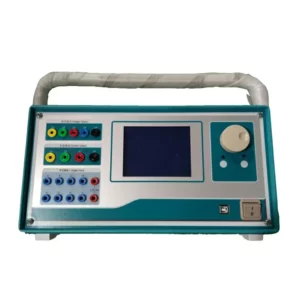The insulation material of the electrodes used in protection relay test sets can affect the test results in several ways:
- Electrical Conductivity: The insulation material should have low electrical conductivity to prevent leakage currents during testing. If the insulation material conducts electricity, it could introduce errors in the test results by altering the electrical characteristics of the circuit being tested.
- Dielectric Strength: The insulation material must have high dielectric strength to withstand the high voltages applied during testing without breaking down. If the insulation material has low dielectric strength, it could lead to insulation breakdown, arcing, or short circuits, which can damage the equipment being tested and provide inaccurate test results.
- Durability: The insulation material should be durable and resistant to wear, abrasion, and chemical degradation. This ensures the longevity of the electrodes and maintains consistent test conditions over time, which is essential for obtaining reliable and repeatable test results.
- Temperature Stability: The insulation material should be stable over a wide range of temperatures to maintain its electrical properties during testing. Temperature variations can affect the insulation resistance and dielectric properties of the material, potentially leading to fluctuations in test results.
- Compatibility: The insulation material should be compatible with the environmental conditions and the types of tests being performed. protection relay test set For example, if the test involves high temperatures or aggressive chemicals, the insulation material should be resistant to heat, moisture, and chemical corrosion to ensure accurate and safe testing.
- Size and Shape: The design and configuration of the electrodes, including the size and shape of the insulation material, can affect the distribution of electric field lines and the accuracy of the test results. Proper electrode design minimizes edge effects, ensures uniform electric field distribution, and improves the reliability of the test measurements.
In summary, the insulation material of the electrodes in protection relay test sets plays a critical role in ensuring accurate and reliable test results. It should have low electrical conductivity, high dielectric strength, durability, temperature stability, compatibility with environmental conditions, and appropriate size and shape to minimize errors and maintain consistent test conditions.
